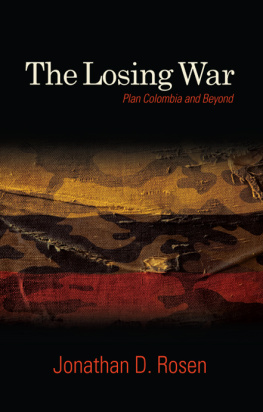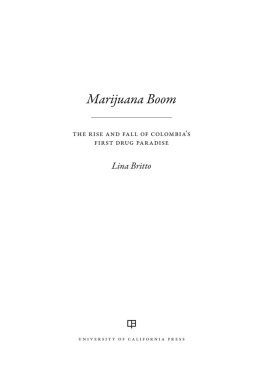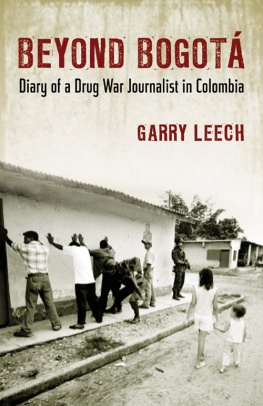The Losing War
SUNY series, James N. Rosenau series in Global Politics
David C. Earnest, editor
The Losing War
Plan Colombia and Beyond
Jonathan D. Rosen
Published by State University of New York Press, Albany
2014 State University of New York
All rights reserved
Printed in the United States of America
No part of this book may be used or reproduced in any manner whatsoever without written permission. No part of this book may be stored in a retrieval system or transmitted in any form or by any means including electronic, electrostatic, magnetic tape, mechanical, photocopying, recording, or otherwise without the prior permission in writing of the publisher.
For information, contact State University of New York Press, Albany, NY
www.sunypress.edu
Production by Ryan Morris
Marketing by Michael Campochiaro
Library of Congress Cataloging-in-Publication Data
Rosen, Jonathan D.
The losing war : Plan Colombia and beyond / Jonathan D. Rosen.
pages cm. (SUNY series, James N. Rosenau series in global politics)
Includes bibliographical references and index.
ISBN 978-1-4384-5299-9 (hardcover : alk. paper)
1. Drug controlColombia. 2. InsurgencyColombia. 3. CounterinsurgencyColombia. 4. Fuerzas Armadas Revolucionarias de Colombia. 5. National securityColombia. 6. ColombiaPolitics and government21st century. 7. Economic assistance, AmericanColombia. 8. Military assistance, AmericanColombia. I. Title.
| HV5840.C7R67 2014 |
| 363.4509861dc23 | 2013042570 |
10 9 8 7 6 5 4 3 2 1
Contents
Timeline
1994 Election of President Ernesto Samper of Colombia
1995 U.S. decertifies Colombia
1996 U.S. decertifies Colombia
1997 U.S. decertifies Colombia
1998 Election of President Andrs Pastrana of Colombia
2000 Plan Colombia signed into law
2001 George W. Bush launches global war on terrorism
2002 Election of lvaro Uribe
2003 Plan Patriota
2007 U.S. signs into law the Mrida Initiative (Plan Mexico)
2008 Election of Barack Obama
2010 Election of Juan Manuel Santos
2011 No mention of Plan Colombia in U.S. budget proposal
Source: Central Intelligence Agency. Public domain. (https://www.cia.gov/library/publications/cia-maps-publications/Colombia.html).
Acknowledgments
This book is a revised and altered version of my dissertation. I would like to thank my dissertation committee members, Elvira Mara Restrepo, Bradford McGuinn, Ambler Moss, and Roger Kanet for all their help. I would like to give special thanks to the chair of the committee and my mentor, Bruce M. Bagley. It has been a true honor and privilege to work with Dr. Bagley, and I would not have been able to publish this book without his leadership, guidance, and encouragement. Thank you, Dr. Bagley, for always making time for me despite your busy schedule.
I also would like to thank Vanessa Rayan for her editorial assistance and Nicols Velsquez for his research assistance in .
A special thanks to Hanna Kassab for his support, encouragement, helpful comments in the dissertation seminar.
I also would like to thank Michael Rinella of SUNY Press for his confidence in my book project and providing me with this excellent opportunity. In addition, I would like to thank the staff at SUNY Press for their hard work, dedication, and assistance in preparing the manuscript. They were extremely professional and helped improve the quality of the book. Finally, I want to thank the Universidad del Mar, Huatulco, Mexico, especially the Institute of International Studies. A special thanks to the Rector of the University, Dr. Modesto Seara Vzquez, for his guidance and leadership. It has been an honor and privilege to work at UMAR.
Introduction
For several decades, Colombia has been at the epicenter of the U.S.-led war on drugs. At various points in its history, Colombia appeared to be on the verge of becoming a narco-state as drug lords, such as Pablo Escobar, roamed free and could virtually do whatever they wanted. Drug traffickers killed many Colombians and used other tactics, such as bribery and extortion. The U.S. wanted to stop drug trafficking in Colombia, which continued despite the death of Pablo Escobar and the collapse of the Medelln and Cali cartels.
This work examines the origins and outcomes of Plan Colombia from 2000 to 2012, using the theoretical concepts and methodological tools drawn from international relations theory and comparative politics to examine the critical junctures and evolution of Plan Colombia from its initial approval in July 13, 2000, by the U.S. Congress through its implementation from Andrs Pastrana (19982002), lvaro Uribe (20022010), until the Juan Manuel Santos administration (2010April 2012).
While much has been written on the formation of Plan Colombia, not a single work exists that examines Plan Colombia from beginning to end. Critics might question why policymakers, analysts, and academics care about Plan Colombia. In other words, what relevance does Plan Colombia have today? Anybody who reads the news recognizes that Mexico, not Colombia, has become the epicenter and focus of the war on drugs. This work argues that Plan Colombia is crucial for understanding why the violence has shifted to Mexico. In some sense, Mexico appears to be the Colombia of the 1990s. In addition, the lessons from Plan Colombia can be applied to other areas today that are experiencing large levels of organized crime and violence as a result of drug trafficking (for example, West Africa).
We must first briefly examine why studying Colombia is necessary for policymakers and academics. Colombia is a critical case in the U.S.-led war on drugs for six reasons.
1. Colombia has been a longtime security threat dating back to the cold war before the emergence of drug trafficking in the country.
2. During the 1970s and beyond, the country became and remains today deeply entrenched in drug cultivation, processing, and trafficking, thus presenting new postcold war security concerns for the United States.
3. Colombia constitutes a microcosm of the failures and successes of the U.S.-led war on drugs.
4. Colombia is located in an important strategic area because it borders the Panama Canal and Brazil, which is a major economic power in the region. Security challenges that transpire in Colombia, therefore, can threaten trade and prosperity for the region.
5. Colombia remains the principle ally of the United States.
6. Colombia is a democracy and Washington does not want its allies to become anti-democratic.
Organization of the Book
This work provides an exhaustive examination of Plan Colombia from beginning to end, which no other work today does. It is organized around several key puzzles or questions that subsequently each become chapters. The concluding chapter analyzes the notion of whether Plan Colombia should be used as a model for other countries. Should policymakers and politicians take the core concepts of Plan Colombia and apply them to other countries such as Mexico and Afghanistan? In other words, it seeks to answer the so what? question, exploring the lessons of Plan Colombia, and determine what analysts should learn from this case. This is something that the United States has failed to do as it continues to implement the same failed strategies again and again.









